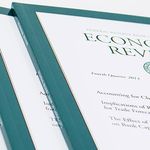Research
Our research staff conducts innovative research on monetary policy, the payments system, and regional and community issues.
Filter Research
Latest Research
Interest Rates and Nonbank Market Share in the U.S. Mortgage Market
Differences in business models help explain how banks gain market share from nonbanks when interest rates are high.
Did Card-Present Fraud Rates Decline in the United States After the Migration to Chip Cards?
The counterfeit fraud rate has not declined for debit cards since the migration to EMV chip-cards.
Labor Market Cooling Has Been Uneven Across Industries
A more detailed version of the KC Fed LMCI shows pockets of tightness and weakness in some industries.
National and International
Tenth District
Publications

Economic Bulletin
Timely, accessible snapshots of the Kansas City Fed's latest economic findings.

Economic Review
A quarterly research publication with articles on macroeconomics and monetary policy and regional and international economics.

Payments System Research Briefings
Briefings cover a range of topics, including payments methods and developments in payments networks.

Research Working Papers
Working papers cover a wide range of economic topics, including monetary policy, payment methods, banking and more.

Charting the Economy
New economic data with insight from our research staff.
Research Staff
Meet our research staff, including Kansas City Fed economists, research associates, regional research associates and visiting scholars.
Jackson Hole Economic Policy Symposium
The Federal Reserve Bank of Kansas City hosts dozens of central bankers, policymakers, academics and economists from around the world at its annual economic policy symposium in Jackson Hole, Wyoming.
